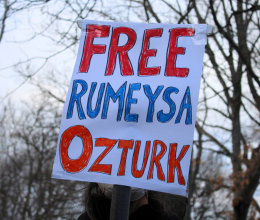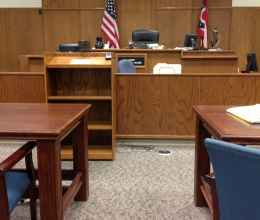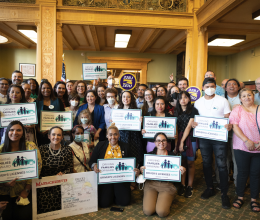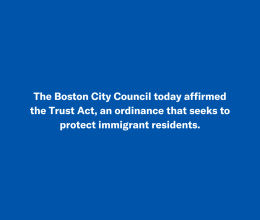
First-of-its-kind decision enforces new state law on U visa certifications
A Massachusetts judge has reversed the Plymouth County Sheriff’s Department’s denial of a former detainee’s request for U visa protections, after the detainee became the victim of a crime while in custody. In what may be the first ruling of its kind, the Superior Court judge found that Plymouth County officials acted illegally when they denied the man’s request for U visa certification, and remanded the matter for a new hearing.
“Our client was the victim of a serious crime while he was being held in immigration detention at the Plymouth County Correctional Facility. This ruling affirms that all people—including those in custody—are entitled to a fair hearing and the full protection of the law, regardless of immigration or custodial status,” said Dan McFadden, staff attorney at the ACLU of Massachusetts. “This ruling also demonstrates that states can take meaningful action to protect immigrants who face injustice in the federal immigration system.”
Michaell Acosta Granados was attacked in September 2021, while he was a civil immigration detainee held in the Plymouth County Correctional Facility. Mr. Acosta cooperated in the investigation of the attack, and later began the application process for a U visa. U visas provide temporary lawful status to immigrants who are victims of certain types of crimes and who are helpful or likely to be helpful in the ensuing investigation. An immigrant is eligible to apply for a U Visa only if a law enforcement agency certifies those facts to federal immigration authorities. In this case, Plymouth officials denied Mr. Acosta’s request for that certification, effectively preventing him from applying for a U visa.
The court found that this denial was illegal for two reasons. First, a new state law prohibited Plymouth from denying such requests unless it enacted a uniform policy for addressing them, and Plymouth had failed to implement any such policy. Second, officials at Plymouth decided that no qualifying crime had been committed without even reviewing the video of what happened. The court concluded that the tape was “critical” evidence and that, by failing to review it, Plymouth had “acted unreasonably and/or in an arbitrary and capricious manner and/or with an abuse of discretion.” This appears to be the first reported case of a judge ordering the reconsideration of a U visa certification denial anywhere in the United States, and the first case enforcing legal standards established under the new Massachusetts law.
“This lawsuit is incredibly important, as it’s one of the first cases to make clear that immigrant survivors of crime have state statutory due process rights to challenge the denial of a U or T visa certification,” said Julie Dahlstrom, director of the BU Law Immigrants’ Rights and Human Trafficking Program. “The court found that an agency cannot arbitrarily refuse to issue an eligible immigrant survivor a U or T visa certification. This victory is a critical signal that Massachusetts agencies cannot arbitrarily refuse to implement important legislative protections for immigrant survivors of crime.”
The recent court victory was based in part on M.G.L. 258F, a law enacted in 2021 to protect immigrant survivors of violent crime and human trafficking. With leadership from Sens. Mark Montigny and Jamie Eldridge, and Reps. Patricia Haddad and Tram Nguyen, the law requires local and state certifying agencies to create policies for the issuance of U and T visa certifications and respond in a timely way to requests.
In 2000, Congress created U and T visas for immigrant survivors of violent crime and human trafficking who stepped forward to cooperate with law enforcement. A key component of the application process is the submission of a certification from a government official, confirming that the individual is a victim of a crime and was helpful in the investigation or prosecution of the crime. The 2021 Massachusetts law established consistent and reliable standards for handling requests for certifications, ensuring survivors will receive timely responses across all jurisdictions in the Commonwealth and basic due process protections.
“We are extremely grateful to the broad coalition that helped enact this important protection for immigrant survivors in 2021, and we are happy to see that the law achieved its intended effect,” said Emily Leung, supervising immigration attorney at the Justice Center of Southeast Massachusetts. “The recent court victory will ensure that immigrant survivors throughout the Commonwealth have access to a consistent, reliable, and fair process for seeking U and T visa certifications from law enforcement agencies.”
The legal challenge to Plymouth's U visa certification denial was brought in December 2021 by the ACLU of Massachusetts, together with attorneys from the Boston University School of Law, Greater Boston Legal Services, the Justice Center of Southeast Massachusetts, Rights Behind Bars, and the law firm Constangy, Brooks, Smith & Prophete LLP.




